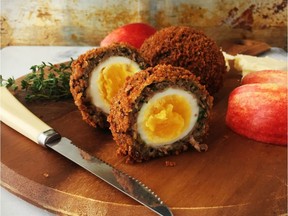Bridges Food: Scotch eggs are due for a moment of glory
Don’t be afraid to make Scotch eggs at home. All you need is hard-boiled eggs, good sausage meat and no fear of deep frying.

Reviews and recommendations are unbiased and products are independently selected. Postmedia may earn an affiliate commission from purchases made through links on this page.
Article content
We talk a lot about eggs in the early spring.
Easter does that to us. We celebrate the delicious devilled egg and the pretty pastel coloured Easter eggs, and we all scarf down one or two of those Cadbury Easter eggs with the Day-Glo yellow centres, and we like it more than we’ll admit.
But it’s time the classic Scotch egg got a nod of glory, too. Not familiar with this pub classic? Scotch eggs are one of the most popular snacks in Britain, and are made of hard-boiled eggs (with the shell removed, of course), wrapped in sausage meat, coated in breadcrumbs and then deep-fried.
Full of flavour and so pretty to look it, it’s easy to see why these hand-held beauties are so beloved.
Where does the term “Scotch egg” come from? Popular theories abound. Apparently there was an important trade in Scotland exporting eggs to London in the 18th and 19th centuries. Victorians would preserve the eggs for the long journey by dipping them in boiling water and leaving them semi-hardened with lime-powder disinfectant in a process called ‘scotching’.

The result left the eggs discoloured, but still perfectly edible for several months. Because the eggs didn’t look appealing, they were wrapped in sausage meat, then breadcrumbs and sold as Scotch eggs.
Another popular story has the Scotch egg originating at a fancy department store. According to luxury food emporium Fortnum & Mason, the Scotch egg was invented at its Piccadilly headquarters in the 18th century for its most hoity-toity customers. The Scotch egg was a travellers’ snack, easy to hold and munch on while riding in a horse-drawn coach.
These days, many a pub will have Scotch eggs on the menu. Salty, fatty, delicious, they go wonderfully with cold beer and good company. Don’t be afraid to make these at home, though. All you need is hard-boiled eggs, good sausage meat and no fear of deep frying.
I boiled the eggs for four and five minutes, and found the four-minute egg to have a softer yolk, which is more appealing in my books.
Don’t worry if your peeled eggs aren’t perfect. The layers of coating will hide any imperfections. I know my peeled hard-boiled eggs look perfectly mangled on occasion. The meat is the most important part of this equation. Buy quality, tasty links, slit them open and place into a bowl along with herbs and mustard.
Hold back on the salt, as the sausages will hold enough. If not, you can always add some finishing salt at the end. Encase the egg in the meat, dip in flour, then egg, then Panko and carefully put them into a hot oil bath for about four minutes, until golden and crispy. Slice open and enjoy along with hunks of good cheddar and fresh fruit.
Scotch Eggs
- 5 large eggs
- 400 g pork breakfast sausage
- 3 Tbsp chopped mixed herbs, such as thyme, rosemary, parsley and chives
- 1 Tbsp Dijon mustard
- ¼ tsp ground nutmeg
- Pinch black pepper
- 1 Tbsp whole milk
- ½ cup all-purpose flour
- 1 cup panko crumbs
- 6 cups canola oil, for frying
1. Put four of the eggs into a saucepan, cover with cold water and bring to a boil. Turn down the heat to medium-low and simmer for four minutes. Put the eggs immediately into a large bowl of ice cold water for at least 10 minutes. Peel them and set aside.
2. Remove the sausage from its casings and place in a large bowl along with the herbs, Dijon, nutmeg and pepper. Mix well with your hands and divide into four balls.
3. In a small bowl, beat the remaining egg with the milk. In a shallow bowl, add the flour and season with a pinch or two or salt and pepper. Into a third bowl, add the panko crumbs. Arrange the bowls in an assembly line, beginning with the flour, then the eggs, then the crumbs.
4. Put a piece of plastic wrap on your work surface and lightly flour it. Put one of the meatballs in the centre, and flour lightly, then fold the plastic wrap on top. Flatten out the meat until large enough to encase an egg.
5. To assemble the egg, roll one peeled egg in flour, then put in the centre of the meat. Bring up the sides of the film to encase it, and smooth it into an egg shape with your hands. Dip each egg in flour, then egg, then breadcrumbs. Place the breaded eggs on a small plate or tray.
6. Fill a medium, deep saucepan a third full of vegetable oil, and heat to 170C (or when a crumb of bread sizzles and turns golden, but does not burn, when dropped in it). Cook two eggs at a time, for about four minutes, until crisp and golden, then drain on paper towel before serving.
7. Let the Scotch eggs cool down for a few minutes before slicing. Serve hot. Makes four Scotch eggs.






Postmedia is committed to maintaining a lively but civil forum for discussion. Please keep comments relevant and respectful. Comments may take up to an hour to appear on the site. You will receive an email if there is a reply to your comment, an update to a thread you follow or if a user you follow comments. Visit our Community Guidelines for more information.